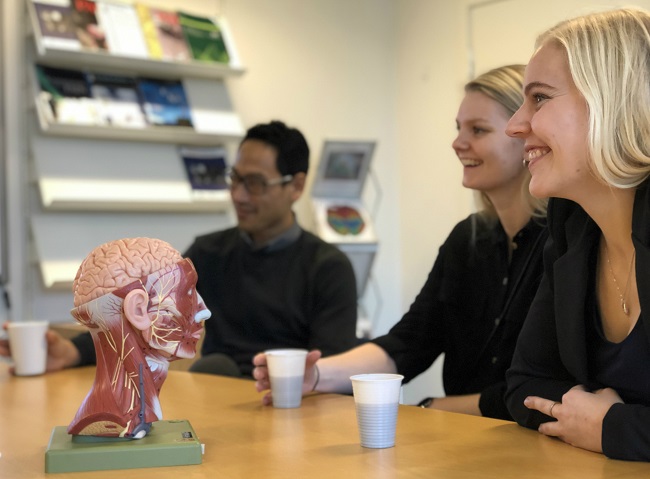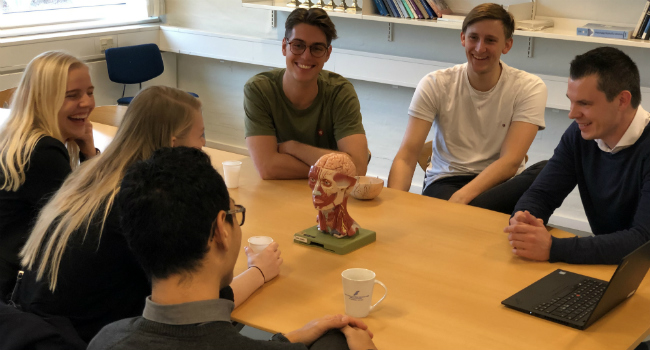Research and teaching go hand in hand at Aalborg University, and teaching is based on Problem-Based Learning (PBL) – that is, case work and projects are formed based on practical issues. This enables the students to study and work practically with specific interest areas. The choice was chronic pain for medical students Alexander T. Staffe, Mathias W. Bech, Sara L. K. Clemmensen, and Henriette T. Nielsen, when they were choosing their focus area for their bachelor project.
SLEEP AND CHRONIC PAIN
Up towards 50% of patients with chronic pain suffer from sleep problems, and research has shown that sleep problems can worsen the intensity of chronic pain. It was this issue that caught the interest of the group of medical students. There are many theories on which mechanisms that are involved in the relationship between reduced sleep quality and worsening of pain. The thesis of the group, that reduced sleep quality may affect the nervous system, formed the starting point for their bachelor project. Therefore, the group contacted postdoc Dennis Boye Larsen and associate professor Kristian Kjær Petersen from the research group Translational Pain Biomarkers – a leading part of the international pain research environment at Department of Health Science and Technology https://www.hst.aau.dk/ at Aalborg University. Here, the collaboration between the research group and the students started, and together they performed a study on reduced sleep quality and the effect of this on the nervous system. The research result was clear; just one night with reduced sleep quality caused increased pain sensitivity (measured by pressure and heat). Increased pain sensitivity is often seen in patients with chronic pain and the research results from the study can therefore increase the knowledge on how the nervous system is affected. In the long term, this can lead to better treatment for patients.
Medical student Alexander T. Staffe explains:
– As future medical doctors, it will only benefit us and future patients that we through our work with this project have achieved a more detailed picture of how different factors such as sleep can influence the way the body reacts to pain.
The article ”Total sleep deprivation increases pain sensitivity, impairs conditioned pain modulation and facilitates temporal summation of pain in healthy participants” has just been published in the scientific journal PLOS ONE – and marks, already at a bachelor level, a landmark step for the four students.
PAIN RESEARCH IN MEDICAL EDUCATION
Aalborg University (and Denmark in general) is renowned for its pain research. Chronic pain was acknowledged as a disease (not a symptom) by The World Health Organization (WHO) on the 25th of May this year, which means that chronic pain will now be part of The International Classification of Diseases (ICD) from the 1st of January 2022. Despite this, a larger European report from 2015, which went through the teaching curriculum across countries, stated that medical students in Denmark did not receive dedicated teaching in diagnostics or treatment of patients with chronic pain.
Professor Lars Arendt-Nielsen, head of the Translational Pain Biomarkers research group is therefore extremely excited for the collaboration and the research result:
– I find it problematic, that chronic pain affects 20% of the world’s population and that we, as a university, are not educating medical doctors who can treat this growing group of patients. Therefore, I have, in collaboration with Kristian Kjær Petersen, allocated resources to focus on research projects where medical students are involved, so we through research can offer custom-made projects to interested medical students.
SYNERGY BETWEEN RESEARCH AND TEACHING
The combination of research and teaching has been both inspiring and an important motivation factor for the group of medical students during the work with their bachelor thesis:
– Working with Kristian and Dennis has given us a good insight into how it is to work with science. In addition, it has given us the opportunity to go in depth with understanding the nervous system on a more advanced level than we have done earlier during our bachelor education”, Mathias W. Bech explains.
– This is a prime example of how teaching and research can support each other – and in addition, these are really exciting results”, Lars Arendt-Nielsen states.
Head of Department Kim Dremstrup, Department of Health Science and Technology adds:
– It is in-between research and education that we as a university can contribute to educating health professionals of the future and develop our health care. The way we teach – problem-based learning – is one of the solutions to this development. The strength of excellence research and the interaction between research and education can therefore lead to research-based teaching as well as teaching-based research.





















